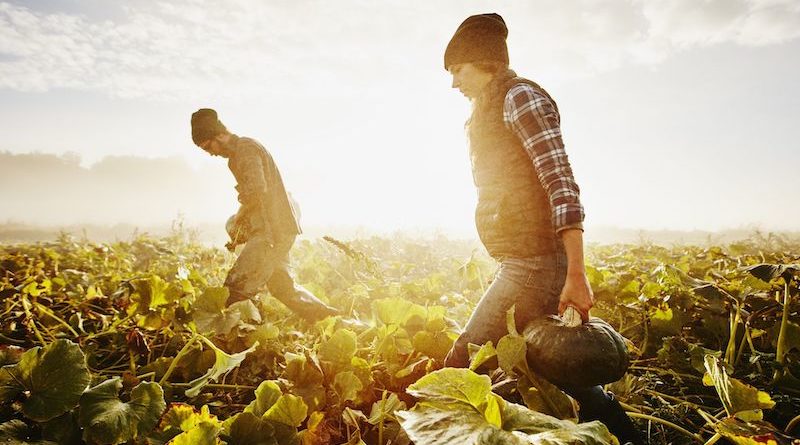
Yes! The relocalisation of food supply chains can lead to food security in the European Union and to a healthier planet
Global warming continues to accelerate, while biodiversity and species diversity are increasingly threatened. Many things on our planet are out of balance.
Despite the corona pandemic, we should not forget that the climate crisis remains the biggest challenge facing Europe and the whole world . Closely related to this is the question of securing our food supply. And this is clearly linked to the climate, because our food systems are dependent on biodiversity and healthy ecosystems. Our current food system, however, is geared towards earnings and profit maximization.
Environmental toxins are becoming almost ubiquitious and making us sick, too. Therefore we urgently need to transform our food systems and agriculture.
Agriculture in particular is an important sector that depends on and should contribute to the health of our planet. Instead, it remains highly dependent on fossil fuels and consumes more energy than it produces: agricultural land use alone is responsible for around 40% of the carbon dioxide emitted worldwide. Healthy ecosystems are thus not promoted, but destroyed. As a result, soil fertility and biodiversity gradually decline. In addition to production, the processing, packaging and transport of food naturally also cause additional carbon dioxide emissions. In 2017 alone, around 1.3 billion tons of agricultural, forestry and fishing products were transported by road in the European Union.
In May this year, the European Commission presented the Farm to Fork Strategy for a fair, healthy and environmentally friendly food system. One objective of this strategy is the strengthening of regional and local food systems and the creation of shorter supply chains. The proposals of the Commission in the field of sustainable food production are very welcome. Surely it is in all our interests that European food should once again be produced in a more socially, ethically and environmentally friendly way and be healthy for all of us.
In a few weeks‘ time, the Common European Agricultural Policy for the next seven years will be negotiated in a trialogue.
The implementation of the Farm to Fork Strategy in the CAP would have been an important first step towards stable and sustainable food security. However, instead of seizing this great opportunity and enabling and strengthening climate-friendly agriculture and thus a sustainable food policy, an old system hostile to the climate is being maintained.
There are plenty of ideas for the implementation of environmentally friendly agricultural practices. Soil fertility, regionality and the preservation of biodiversity play a major role.
And this is also what the citizens of the European Union want. In a recent survey, the following points were identified as the most important measures of the coming CAP: Healthy food, combating climate change and ensuring a fair standard of living for farmers.
One type of agriculture that takes into account the climate, soil, plants, animals and people – as producers and consumers – is Community Supported Agriculture. Here, customers pay in advance for a share of the harvest and thus share the risk of a possible crop failure with the producer. The idea behind this concept is that farmers provide people in their surroundings with healthy food. Conversely, farmers can be successful in the long term, because they are provided with the necessary financial resources. An essential aspect of the CSA is that both ecological and economic management are transparent. The aim is creating a closed cycle, where consumers are no longer just shoppers, but part of the agricultural sector. This will strengthen the region – ecologically, economically and socially.
The pandemic we are experiencing shows that particularly awareness of regional food is increasing. For example, surveys from Austria show that since the outbreak of the corona virus began, citizens‘ awareness of regional foods has risen sharply and people are now more likely to cook for themselves again.
The awareness of healthy food is increasing among the population and it is precisely this awareness that regional agriculture would like to strengthen.
People should be able to relate to food again, where it comes from and how it is produced. At the same time we all have a responsibility towards natural resources and living beings.
Small regional farms must be strengthened, thereby creating jobs, shortening supply chains and improving the environment.
Other local food systems include Food Assemblies, which are based on online ordering systems and therefore less demanding for their members. Thus, you order online and a few days later you pick up the regional food in a central depot.
Many small citizens‘ initiatives already support the model of sustainable agriculture. But for the European Union to really move towards sustainable agriculture, it is essential that public authorities, such as hospitals and schools, also buy from smaller local suppliers, thereby supporting small-scale farming, traditional breeds, artisanal processing and family businesses.
Agriculture is the pillar of our existence. We cannot shift the responsibility to individuals and say: „You have to do this and that now and save the world on your own!“ Instead, politics must create framework conditions that promote what is right and what is good and not just reduce bad practices a little bit. We must start today to build the food system we want to have in the future.




